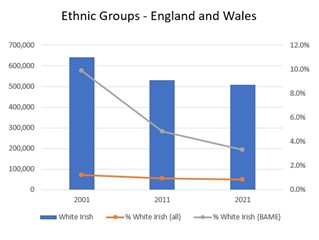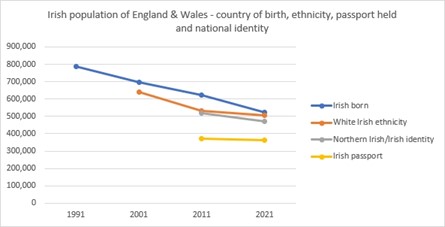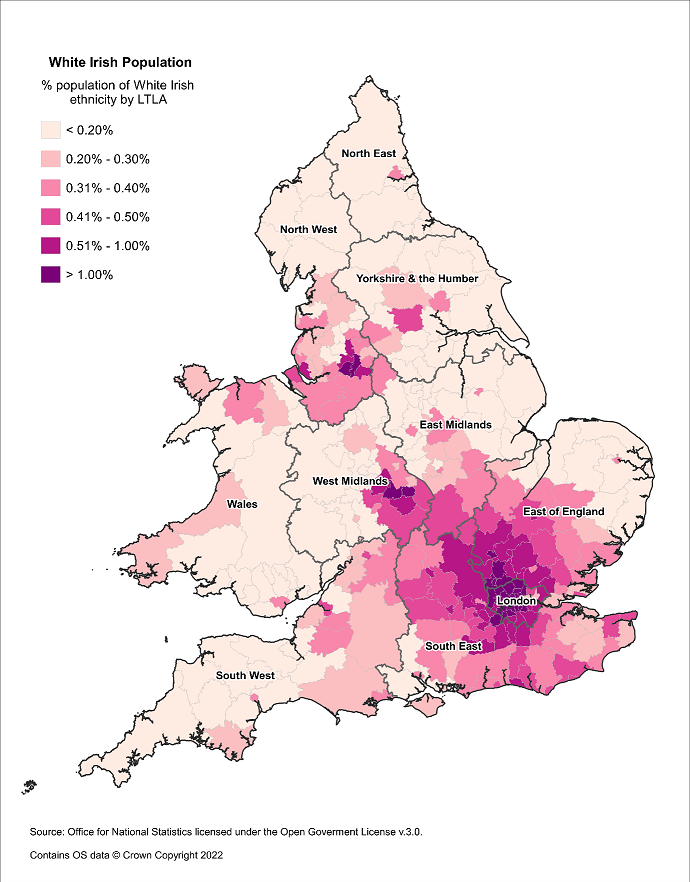Tuesday, 29 November 2022
The number of people who identified as ‘White Irish’ in England and Wales at the time of the 2021 Census, has fallen by 4.4 per cent, with a total of 507,465 people (23,622 down from the previous Census of 2011).
Experts analysing the Census say that the overall picture emerging from the data, however, is much more nuanced, and raises important questions about changing communities – and identities – across Britain.
The analysis, led by the University of Nottingham, working with the national charity and membership network, Irish in Britain, has found that the largest decline in self-identified ‘White Irish’ was seen in the West Midlands (-13.3 per cent) and London (-11.2 per cent). By contrast, the South West saw a 10.8 per cent increase in White Irish population – as indicated by the data published today by the Office for National Statistics (ONS).
The ‘White Irish’ population is one of the oldest – and, once largest - minorities in England and Wales, yet it is amongst the very few that have seen a decline in numbers. This is against a wider picture which sees a reduction of ‘White British’ people and an increase of so-called BAME groups (now about 20 per cent of the total resident population).
The academics say there are many factors which may have contributed to this: the health/older age profile of this population is highly significant, but return migration and, most recently, Brexit and Covid are also likely to play a significant role.
They say that, at the same time, it is important to point out that the percentage of the population who identify as Irish remains the same relative to the overall population: 0.9 per cent (the very same figure recorded a decade ago).
Dr Mary Tilki said during the ‘Irish in Britain’ AGM earlier this month, a simplistic "narrative of decline" should be challenged. The experts found that, when bringing together data on country, passport, national identity, second generations, and ethnicity, the picture gets much more complex.
 Bar chart showing Irish Ethnic Groups in England and Wales in 2001, 2011 and 2021
Bar chart showing Irish Ethnic Groups in England and Wales in 2001, 2011 and 2021
Between the 2011 and 2021 census there's been a notable increase in ‘Mixed or multiple ethnic groups’: from 1.2 to 1.7 million people (2.9 per cent of all residents). These would include, for example, many people of Irish heritage. And the ONS’ own data reports highlight that Ethnicity also varies within households and across generations. In 2021, 10 per cent of households had more than one ethnic group represented; and in 1.8 per cent "ethnic groups differ between generations but not within partnerships"
The 2021 Census is only the second census in which the ONS has collected data on individuals’ “national identity”. In this respect, the total number of people identifying as Northern Irish and/or Irish fell by 9.3 per cent from around 520,000 to just over 470,000. The largest Irish population remains in London, where around 1 in 65 people identify, at least in part, as Irish or Northern Irish.
The only region to see an increase in the proportion of people identifying as Irish and/or Northern Irish was the South West of England – the experts say, correlating to some extent with the increase in White Irish population in this region.
The more we will be able to break down and cross-tabulate data, the more we get a nuanced picture. Once again, the value and interest of Census data is twofold: on the one hand it provides us with a rich and detailed source of evidence; on the other, with all its inherent limitations, it allows us to reflect on the increasing complexity of people’s identities in contemporary Britain.
 Line graph showing data on Irish population of England and Wales, including country of birth, ethnicity, passport held and national identity.
Line graph showing data on Irish population of England and Wales, including country of birth, ethnicity, passport held and national identity.
A first ‘Data Explainer’ published by the research team at the start of the project, already highlighted that the reduction in the number of ‘Irish-born’ people in England and Wales was not at all matched by the data on those holding an Irish passport. This was identified as a potential “Brexit effect”, whereby people who had previously held a British passport have instead applied for an Irish passport, thanks to family links or Irish spouses.
In the coming months the project team will continue to analyse new data, as these are published by the ONS. Focusing on Irish communities, the study will also look at those who identify as “Gypsy/Irish Traveller”. The figures released today indicate this population has increased by 17.5 per cent over the last decade, from 57,680 to 67,768. Some regions, such as the North East and North West have seen a particularly high increase (though relative to an overall Gypsy/Irish Traveller population of just a few thousand people); whilst London was the only region to see a decrease (from around 8,000 to 7,000, i.e. -14.2 per cent).
The latest data starts to helps us understand an evolving picture of Irish identity through the lens of the generational legacy and against the backdrop of profound changes in Britain in the last decade. New patterns are emerging, reductions within some of the traditional urban areas, increases in the South West and GRT populations. The community identifies itself today through more integrated ways and acknowledges the long arc of Irish migrant history in Britain into the 21st century.
For more in-depth analysis, the 2021 Census Analysis Reports will be published on the Irish in Britain website here.
The research team, led by Dr Alessio D’Angelo at the University of Nottingham, includes Dr Neil Kaye, Research Fellow at UCL’s Institute of Education, Dr Alastair Munro, Researcher at the University of Nottingham, and Professor Louise Ryan, Director of Global Diversities and Inequalities Research Centre at London Metropolitan University.

Story credits
More information is available from Dr Alessio D’Angelo in the School of Sociology and Social Policy at the University of Nottingham at alessio.dangelo@nottingham.ac.uk
Notes to editors:
About the University of Nottingham
Ranked 97 in the world and 17th in the UK by the QS World University Rankings, the University of Nottingham is a founding member of Russell Group of research-intensive universities. Studying at the University of Nottingham is a life-changing experience, and we pride ourselves on unlocking the potential of our students. We have a pioneering spirit, expressed in the vision of our founder Sir Jesse Boot, which has seen us lead the way in establishing campuses in China and Malaysia - part of a globally connected network of education, research and industrial engagement.
Nottingham was crowned Sports University of the Year by The Times and Sunday Times Good University Guide 2024 – the third time it has been given the honour since 2018 – and by the Daily Mail University Guide 2024.
The university is among the best universities in the UK for the strength of our research, positioned seventh for research power in the UK according to REF 2021. The birthplace of discoveries such as MRI and ibuprofen, our innovations transform lives and tackle global problems such as sustainable food supplies, ending modern slavery, developing greener transport, and reducing reliance on fossil fuels.
The university is a major employer and industry partner - locally and globally - and our graduates are the third most targeted by the UK's top employers, according to The Graduate Market in 2024 report by High Fliers Research.
We lead the Universities for Nottingham initiative, in partnership with Nottingham Trent University, a pioneering collaboration between the city’s two world-class institutions to improve levels of prosperity, opportunity, sustainability, health and wellbeing for residents in the city and region we are proud to call home.
More news…